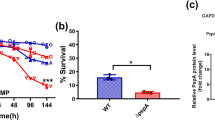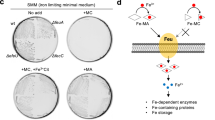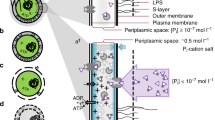Abstract
THE lethal effect of chilling on certain exponential phase Gram-negative bacteria (‘cold shock’)1 may be due to interference with bacterial permeability control mechanisms2. Evidence supporting this view is that, on chilling, susceptible bacteria release normal endocellular constituents into the environment3 and are more permeable than similar unchilled bacteria to various substances including ribonuclease4. Cold shock also affects the stability of endogenous RNA. Thus, if susceptible bacteria are chilled and then incubated in fresh diluent at 37°, the rate of RNA-degradation increases with the duration of chilling4. In view of these symptoms of cold shock, the protection afforded to chilled bacteria by magnesium ions3 may be due to the metal's stabilizing effect on bacterial membranes concerned with osmotic control and/or endogenous RNA. In this connexion it is well known that magnesium stabilizes isolated protoplast membranes5, spheroplasts6 and ribosomes7. This note reports the use of the ‘optical effect’8 to determine the influence of magnesium on permeability control in exponential phase Aerobacter aerogenes during chilling.
This is a preview of subscription content, access via your institution
Access options
Subscribe to this journal
Receive 51 print issues and online access
$199.00 per year
only $3.90 per issue
Buy this article
- Purchase on Springer Link
- Instant access to full article PDF
Prices may be subject to local taxes which are calculated during checkout
Similar content being viewed by others
References
Sherman, J. M., and Albus, W. R., J. Bact., 8, 127 (1923). Hegarty, C. P., and Weeks, O. B., ibid., 39, 475 (1940). Gorril, R. H. and McNeil, E. M., J. Gen. Microbiol., 22, 437 (1960).
Meynell, G. G., J. Gen. Microbiol., 19, 380 (1958).
Strange, R. E., and Dark, F. A., J. Gen. Microbiol., 29, 719 (1962). Strange, R. E., and Ness, A. G., Nature, 197, 819 (1963).
Strange, R. E., and Postgate, J. R. (in preparation).
Weibull, C., in Bacterial Anatomy, Symp. Soc. Gen. Microbiol., 6, 111 (1956).
Lederberg, J., Proc. U.S. Nat. Acad. Sci., 42, 574 (1956). McQuillen, K., J. Gen. Microbiol., 18, 498 (1958).
McQuillen, K., Prog. Biophys. and Biophysical Chem., 12, 69 (1962).
Mager, J., Kuczynsti, M., Shatzberg, G., and Avi-Dor, Y., J. Gen. Microbiol., 14, 69 (1956).
Strange, R. E., and Shon, M., J. Gen. Microbiol., 34, 99 (1964).
Postgate, J. R., Crumpton, J. E., and Hunter, J. R., J. Gen. Microbiol., 24, 15 (1961).
Postgate, J. R., and Hunter, J. R., J. Gen. Microbiol., 29, 233 (1962).
Author information
Authors and Affiliations
Rights and permissions
About this article
Cite this article
STRANGE, R. Effect of Magnesium on Permeability Control in Chilled Bacteria. Nature 203, 1304–1305 (1964). https://doi.org/10.1038/2031304a0
Published:
Issue Date:
DOI: https://doi.org/10.1038/2031304a0
This article is cited by
-
Ion uptake by cold-injured rice roots
Plant and Soil (1972)
-
The rapid loss of viability ofAzotobacter in aqueous solutions
Antonie van Leeuwenhoek (1969)
-
Continuous cultivation of microorganisms
Folia Microbiologica (1965)
Comments
By submitting a comment you agree to abide by our Terms and Community Guidelines. If you find something abusive or that does not comply with our terms or guidelines please flag it as inappropriate.



